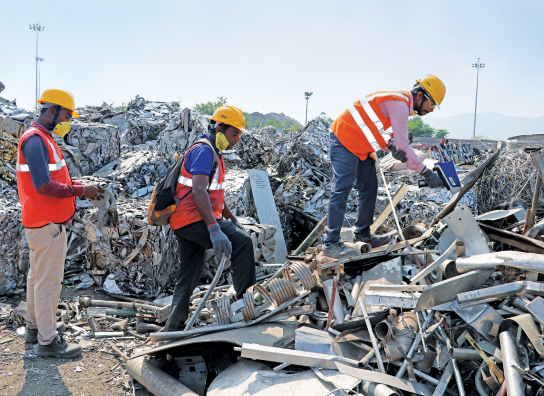Environment Initiatives
Jindal Stainless Ltd is deeply committed to environmental stewardship and sustainability. From embracing renewable energy and green hydrogen to reducing carbon emissions, conserving biodiversity, promoting the circular economy and implementing effective water management strategies, Jindal Stainless Ltd. is determined to ensure a greener, more sustainable future through the power of innovation.
Renewable Energy
Jindal Stainless has entered into a partnership with ReNew Power, India's largest renewable energy company, to provide clean energy at its Jajpur plant. This will be achieved through a 100 MW RE RTC (Renewable Energy Round-The-Clock) project. Additionally, a 7.3 MWp floating solar power plant has been installed on the water reservoir of the Jajpur unit and a 3.5 MWp rooftop solar plant has been set up at the Hisar unit. These renewable energy initiatives are expected to generate over 1,179.8 million units (kWh) of clean electricity and have the potential to reduce carbon emissions by over 11.51 lakh tonnes over their 25-year lifespan.
Green Hydrogen
Jindal Stainless is taking a pioneering step by becoming the first stainless steel company in India to commission a green hydrogen plant. The plant, located at the Hisar unit, will have a capacity of 90 NM3/hr. Furthermore, a feasibility study is currently underway for a 700 NM3 per hour green hydrogen project at the Jajpur unit. These initiatives demonstrate the Company's commitment to exploring and adopting sustainable and low-carbon alternatives in its operations.

Carbon Reduction
Jindal Stainless Ltd has set ambitious targets to become Net-Zero by FY50 and aims to achieve a 50% reduction in emission intensity by FY35 compared to the baseline figures of FY22. To achieve these goals, the Company is taking several measures. It is decarbonising its entire fleet of employee transportation by transitioning to electric vehicles. Efforts to increase railway transportation and reduce road transportation have resulted in a 20% increase in railway usage, leading to a significant reduction of 4,562 tons of carbon emissions. Jindal Stainless Ltd has also implemented various energysaving measures, such as reducing fuel consumption in the furnace, optimising the oxygen plant, implementing waste heat recovery systems, using energyefficient water pumps, IE3 electric motors and installing 100% LED lights. These initiatives have resulted in substantial fuel and energy savings, along with a reduction of 50,523 MT CO2 emissions.
Biodiversity
Jindal Stainless is committed to preserving biodiversity and follows a risk-based approach to ensure that biodiversity considerations are integrated into its decision-making processes. The Company does not operate in World Heritage areas and IUCN Category I-IV protected areas. Furthermore, its plants are not located within a 10 km radius of any national parks or biodiversity hotspot areas. Jindal Stainless Ltd has established a state-of-the-art 'Centre for Environmental Excellence' equipped with sophisticated R&D systems. The Company also conducts regular tree plantation drives to contribute to the conservation and enhancement of biodiversity
Circular Economy
Jindal Stainless Ltd is actively engaged in promoting a circular economy by reducing its reliance on natural resources. The Company produces a significant portion of its stainless steel from recycled scrap-metal recovered from slag-grinding dust, thereby minimising the need for virgin resources. Additionally, Jindal Stainless Ltd ensures the reuse of various industrial by-products. Fly ash generated from the Captive Power Plant is reused 100% for cement plants, brick manufacturers and sheet manufacturers. Bottom ash is utilised in road making. Slag from the Steel Melting Shop & Ferro Alloy Plant is processed to recover valuable metals and any rejected slag is reused in road construction. Hazardous wastes, such as used oil and waste oil, are sold for further recycling. E-waste generated from the plant is also sold to authorised re-processors. Sludge from the BOD (Biological Oxygen Demand) plant of the Coke Oven is reused in the Coke Oven battery. These initiatives contribute to the reduction of waste generation and the efficient utilisation of resources.


Water Management
Jindal Stainless Ltd has implemented a comprehensive water management system to ensure sustainable water usage. The Company has established its own effluent treatment plants (ETP) to treat wastewater through recycling and recovery processes. This ensures that no wastewater is discharged into the environment. The treated wastewater is reused for various internal purposes, including hot slab/coil cooling, slag quenching, dilution water, ash slurry making, road washing and firefighting. Jindal Stainless Ltd also promotes rooftop water harvesting and utilises recycled water and harvested rainwater for 39% of its total water consumption. These measures contribute to efficient water management and conservation.